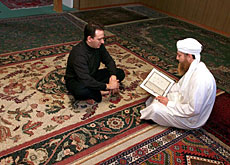Study dispels Muslim clichés

Switzerland's 310,000-strong Islamic community is very diverse and most Muslims have no problem practising their religion, according to a study.
The report, the first of its kind in Switzerland, surveyed 30 Muslims on behalf of the Federal Foreigners Commission. The aim was to provide a more balanced portrait of the community.
Among its findings, which were released on Thursday, was that the community was very mixed. Coming from different countries and cultural backgrounds, religious practices varied. Only a small minority could be considered strict believers.
“This study is going to help calm down a certain number of fears among the population about Muslims in Switzerland,” the commission’s head, Francis Matthey, told swissinfo.
He added that many of the clichés about Muslims were simply not true.
One of its main findings was that most Muslims had no problem practising their religion while keeping to Swiss law and the principles of Swiss democracy.
Co-author Matteo Gianni said that, for many, religion was a private affair and that for this reason the influence of Imams was not so large as is generally feared.
Earlier this month the Swiss authorities barred Geneva’s Islamic Centre from hiring a Turkish imam because of doubts over the content of his teachings.
Headscarves
Problems were identified with regard to certain religious practices, such as wearing a headscarf, which divided Muslims living in the country.
The issue is a divisive one in Switzerland, with some cantons banning the wearing of headscarves. On Wednesday the city of Fribourg said it would not back down over a decision to sack two school employees for refusing to remove their headscarves.
Gianni said many Muslims praised Swiss integration policy and a majority said they were influenced by Swiss culture.
It seems to be that the integration of Muslims in Switzerland is good,” remarked Matthey. “We have handled the situation well on a pragmatic level.”
But the report found that discrimination or racism were still issues – such as harassment of women wearing traditional headscarves.
Some Muslims also felt that they had been more closely scrutinised since the September 11 attacks on the United States in 2001.
Better understanding
The report was carried out by the Group of researchers on Islam in Switzerland and asked 30 men and women from the community for their views. The aim was to give a voice to the “silent majority” to help contribute to national cohesion and better understanding.
Speaking at the media conference to introduce the study, Amira Hafner-AlJabaji, a Swiss of Iraqi origin, who is a specialist in Islam issues, said the survey was “an important step” towards a better mutual understanding.
The number of Muslims in Switzerland has risen sharply in the past 30 years. In 1970 the number stood at around 16,350, but this had risen to 310,000 by 2000.
This means that the community now makes up 4.5 per cent of the population.
The majority come from the Balkans and from Turkey. But only 36,000 of Muslims living in Switzerland have a Swiss passport.
swissinfo with agencies
According to the 2000 census, there are 310’807 Muslims in Switzerland.
90% of Muslims in Switzerland come from Turkey and the Balkans.
Arabic speakers make up 6% and the rest are from diverse backgrounds.
Around 1 in 10 have a Swiss passport.
The Muslim population is mainly young and city dwelling. Half are under 25-years-old and a good majority are second generation.
Only a small majority can be considered strict Muslims.
The study is not meant to be a representative or scientific one. The authors say it was qualitative rather than quantitative.
30 people were interviewed who were chosen for their religious profile and cultural background.
The report was based on the mandate received from the Federal Foreigners Commission. There were not enough resources to go further, explained the authors.
It was aimed at contributing to national cohesion and to a better mutual understanding.

In compliance with the JTI standards
More: SWI swissinfo.ch certified by the Journalism Trust Initiative











You can find an overview of ongoing debates with our journalists here . Please join us!
If you want to start a conversation about a topic raised in this article or want to report factual errors, email us at english@swissinfo.ch.